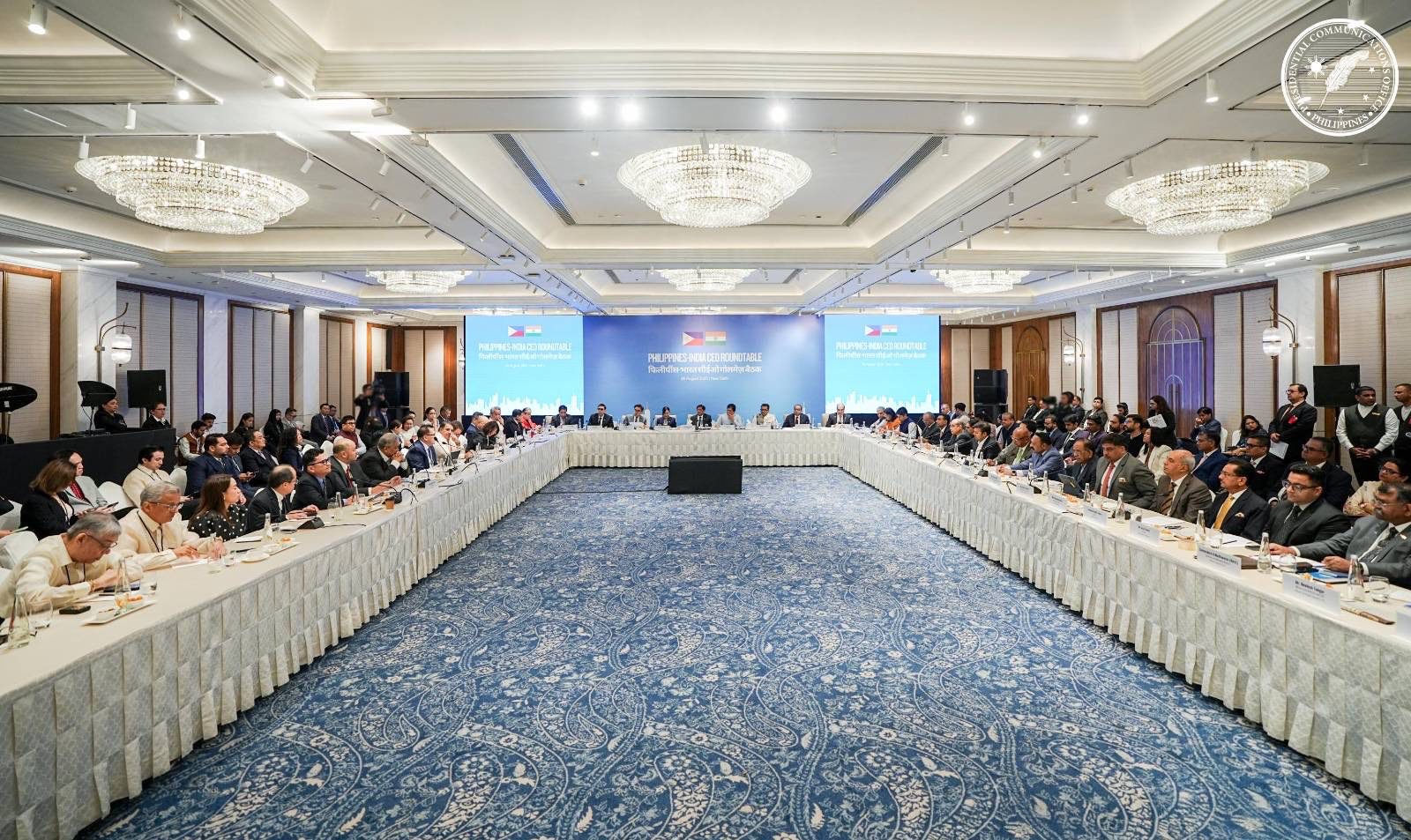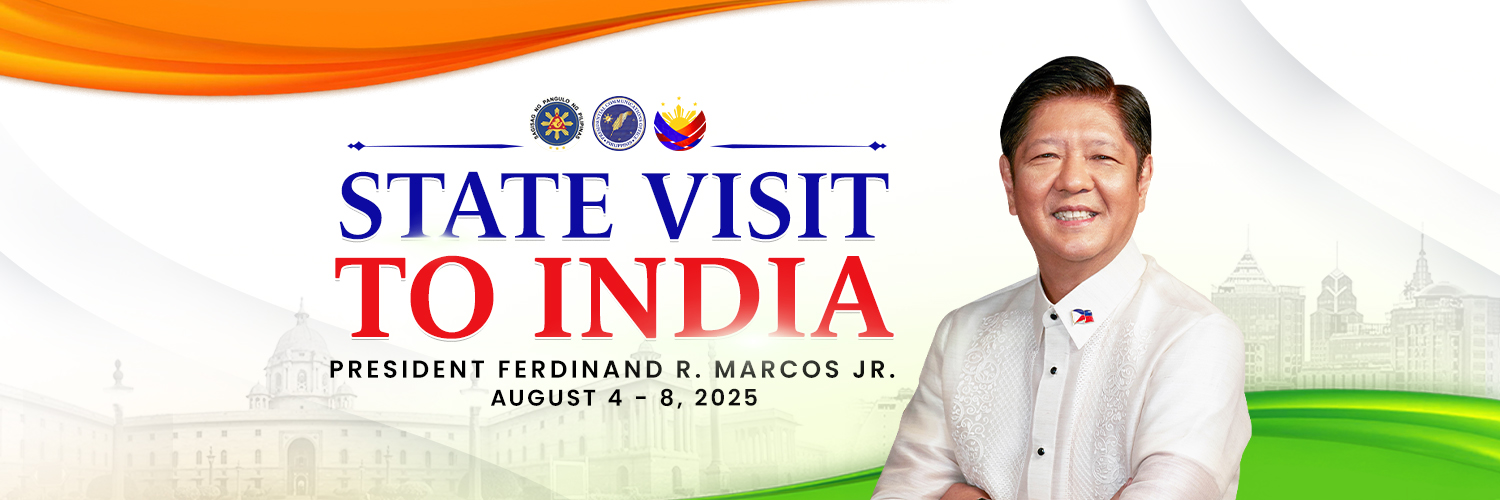
The Minister of Commerce and Industry Piyush Goyal; the Minister of State for External Affairs Pabitra Margherita; of course, the Trade and Industry Secretary Chris Roque; and the other members of the Philippine Cabinet; and I would just like to point out that half of the Philippine cabinet has accompanied me on this trip, which is an indication of our commitment to making this a productive and constructive visit for which we are hoping to bring home a great many, a great much progress in the deepening relationship between India and the Philippines on many, many fronts; and as well, in the number of Cabinet Secretaries with me indicates the areas of potential that we see, the multitude areas of potential that we see, that we can surely develop between India and the Philippines; I would also like to greet the FICCI President Harsha Bardana Garwal, and the FICCI Philippines chairman, Rex Daryanani, and my friends and partners from the Philippines and from India; ladies and gentlemen, good morning. Namaskar.
On behalf of the Philippine delegation, I would like to thank you all for coming to join us at the CEO roundtable. And I would like to note, of course, and commend the Department of Industry and the Federation of Indian Chambers of Commerce and Industry for organizing this roundtable.
These engagements are vital in creating the spaces where governments and businesses can come together, not simply to exchange ideas, but to build real partnerships that support jobs, innovation, and inclusive growth.
It is a pleasure to be in New Delhi today. My visit to this country is a reminder of the deepening friendship and shared aspirations between our two peoples. I’m most grateful to be welcomed by your confidence in the Philippines and in the Filipino people.
Our discussions today have demonstrated the strength of our strategic partnership, especially in trade and investment. They certainly show how far we have come and how much more we can achieve if we continue to work together in a spirit of cooperation and shared prosperity.
The Philippines and India are natural economic partners. We are two of Asia’s fastest-growing economies. We are powered by a youthful, skilled population. Moreover, we are both committed to building resilient, innovation-driven economies that deliver opportunities for our peoples.
I am proud to share that our economy has sustained its growth momentum, recording a 5.7 percent GDP growth last year. Our financial and banking sectors are healthy and robust, and our credit rating continues to improve and to receive stable and positive investment grades.
Indeed, the Philippines’ economic achievements in the past year reflect the sustained efforts of this administration, supported by the private sector in fostering and enabling a business environment.
We are doing this by cutting red tape, lowering the cost of doing business, and improving competitiveness, providing a red carpet welcome to investors around the world.
To support these goals, the Philippines has initiated important legislative amendments to existing laws to further open the economy to foreign investments. I assure you that the Philippine Government is steadfast in its commitment to continuously support current and prospective Indian investors.
We began by tackling one of the most common investment concerns — the bureaucracy. I issued Executive Order Number 18, establishing green lanes for strategic investment. This ensures expedited, streamlined processing of strategic investments across government agencies and local units.
Our goal is to eliminate red tape, reduce uncertainty, and create a seamless experience for high-impact projects.
We also passed the Public-Private Partnership Code of the Philippines to consolidate and modernize our PPP frameworks. This makes it easier and more attractive for the private sector to participate in infrastructure and development projects.
The law simplifies approval processes across national and local levels. It sets clear thresholds for project classification and strengthens institutional support through an empowered PPP center, a dedicated governing board, and streamlined funding mechanisms for project preparation and risk management.
In our transition to clean and sustainable energy future, we liberalize foreign ownership of projects involving inexhaustible renewable energy resources such as solar, wind, hydro, and ocean energy.
It is similar to the amendments that we have made to the Renewable Energy Act, which aims to attract more foreign investors in clean energy. We aim to raise the share of renewables in our power generation mix to 35% by two the year 2030 and 30% [sorry] 50% by the year 2040 and we welcome India’s collaboration and expertise in engineering, procurement and construction in achieving these targets.
We further strengthened our investment regime through the corporate recovery and tax incentives for enterprises to maximize opportunities for reinvigorating the economy.
Trust the politician to come up with a tongue tied or tongue tied title, so we just call it the CREATE MORE Act, which I signed into law in November 2024. CREATE MORE, clarifies and expands value added, tax and duty incentive availment, simplifies and reduces the cost of doing businesses, enhances global tax incentives and competitiveness, and provides clear rules for transitioning registered business enterprises.
These measures ensure that our fiscal incentives remain time-bound, performance-based, and transparent while responding to the evolving needs of investors.
I urge you to further engage the economic team to learn more about such benefits. Our investment environment is the most open and liberal that it has ever been.
And because economic growth must rest on strong human capital, we also enacted the Enterprise-Based Education and Training Framework act or EBIT. This law builds a structured pathway for the collaboration between business and the academe, aligning training with industry demand and preparing our workforce for globally competitive careers.
These reforms speak to our commitment to create a truly enabling environment for investors, including our valued partners in India.
We are encouraged by the growing momentum in our bilateral trade, which reached USD 3.3 [billion] in 2024-2025 but which Minister Goyal and I agree are is much too small, and that’s a great deal for his exponential growth, as he has brought it up earlier.
This reflects not only the dynamism of our economies, but also the strength of our complex complementarities and the value of sustained dialogue between our governments and business sectors.
It offers a focus and pragmatic path towards deeper economic cooperation, one that allows us to address sensitivities while maximizing mutual gains.
As two of the world’s most promising emerging markets, the Philippines and India, view the PTA as a strategic platform to harness our shared strengths and elevate our economic partnership.
And we have — we are working very hard together to find the common ground so as to make the passage or the agreement of the PTA come as quickly as possible. The very fervent discussion we were having here earlier was just precisely about that, and I think we have found ways to do — to quicken the process.
With strong support from both government and business chambers, we are taking concrete steps towards launching formal negotiations. We also continue to encourage stronger business-to-business collaboration in high-growth sectors such as ICT, digital technology, semiconductors, renewable energy, infrastructure, healthcare and pharmaceuticals. These sectors are aligned with our development priorities and global opportunities.
The central tenet of our plans for development in the Philippines is very much to regard our private sectors as partners in this development program. It is a fundamental policy shift in the Philippines when I took office, and it was immediately — we immediately recognized that we need — the government cannot do everything that we would like to achieve in the time that we have, and therefore we look to the business sector, the private sector, to help us as full partners in that development.
We recognize — and this is because we recognize that the government is good at many things, but there are other things that the private sector does better.
To sustain progress, I am instructing the Department of Trade and Industry to work closely with their Indian counterparts to convene the joint working group on trade and investment at the earliest opportunity.
And we have just again with the discussion we were having, is to decide, is that we will, not only are we going to organize a joint working group on trade and investment, but we will also probably granulate that down to industry specific working groups so that they you are — you’re talking apples to apples, oranges to oranges. And of course, the government will be there to take notes and to understand what is needed by both sides to make all of these things happen.
Furthermore, I’m directing the DTI to lead Philippine efforts towards a Philippine-India Preferential Trade Agreement, laying a strong foundation for deeper, more predictable and mutually beneficial economic integration. I thank all the CEOs for your candor, commitment and ambition.
The Philippine government hears you. We are ready to act, and we’ll work closely with our Indian partners to translate your priorities into real opportunities.
We are here not only to present to you the Philippines as an investment, as an investment destination, we are also here to listen to you, and so that we in the Philippines know what it is that you require to bring that investment to the Philippines.
As we continue to position the Philippines as a prime destination for strategic investments, we remain guided by our commitment to make it happen in the Philippines by creating the conditions for investors to succeed, to thrive and to grow with us.
We stand ready to welcome you to our tropical country so you may personally see what a globally competitive Philippines can offer.
Let us seize this moment and write the next chapter of Philippine-India Economic Partnership. One that is more strategic, more inclusive, more ambitious than ever before.
Let us build a future where our businesses are not just growing but thriving together.
Thank you.
Maraming salamat.
— END —

